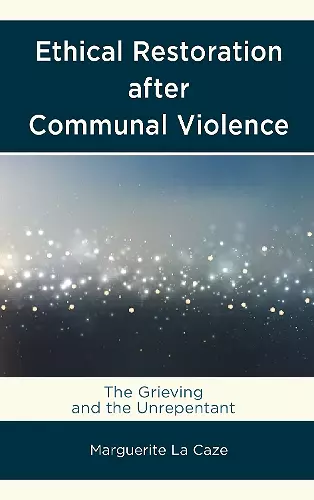Ethical Restoration after Communal Violence
The Grieving and the Unrepentant
Format:Hardback
Publisher:Lexington Books
Published:15th Sep '18
Currently unavailable, and unfortunately no date known when it will be back
This hardback is available in another edition too:
- Paperback£37.00(9781498526715)

Contemporary political ethics has to face the question of how to repair relations which have broken down after crimes, oppression, and political violence. The book employs the work of European and feminist philosophers, including Jacques Derrida, Albert Camus, Simone Beauvoir, Hannah Arendt, Karl Jaspers, Jean-Paul Sartre, Giorgio Agamben, Immanuel Kant, Jean Améry, Vladimir Jankélévitch, Margaret Urban Walker and Linda Radzik to engage with historical and recent cases: the post-liberation French purge, post-genocide Rwanda and post-colonial Australia and draws out the negative and positive conditions of ethical political responses in these contexts. It develops a philosophical account of ethical restoration through focusing on just punishment, guilt and shame, rebuilding political trust, forgiveness and reconciliation, remorse and atonement, and self-forgiveness.
This book offers to political philosophy a coherent, previously under-appreciated, argument for ethical constraints on political projects of rebuilding fractured communities. Taken as a contribution to a range of interdisciplinary discourses in social and political philosophy, peace studies, sociology, and psychology, the book is notable for its careful analysis of the overlapping concepts of forgiveness, atonement and reconciliation. Its focus on community restoration as necessarily ethical is a distinctive addition to this set of discourses, in which social and political restructuring is often too abstractly theorized to even allow this book’s compelling ethical questions to emerge. -- Tracey Nicholls, Soka University
For a long time, Marguerite La Caze has been at the forefront of efforts to interrogate the nature of ethical restoration in post-conflict situations. In her new book, she takes this timely project to a new level, both in terms of analytical rigour and of interpretive commitments. Analyzing such diverse phenomena as the death penalty, gacaca courts and crimes against humanity, Ethical Restoration After Communal Violence makes a highly original contribution to ongoing discussions around responses to violence and injustice. La Caze masterfully weaves together close readings of some of the stalwarts of contemporary European philosophy (amongst others, Améry, Arendt, Beauvoir, Camus, Derrida and Sartre) with investigations into the moral complexity of punishment, trust, forgiveness, reconciliation, atonement and self-forgiveness. This book is exemplary both in style and substance, elegantly written and full of illuminating observations. Political philosophers as well as scholars of transitional justice will have much to learn from it. -- Mathias Thaler, University of Edinburgh
Evil represents, as Paul Ricoeur, once suggested one of the most significant challenges to thinking, but also one of the most deceitful occasions for nonsense. Marguerite La Caze clearly takes up the challenge without falling prey to the nonsense. Her philosophical account of how we should (and should not) respond to legacies of political violence and oppression is lucid, nuanced, and meticulous. La Caze is sensitive and respectful to the people involved, and she successfully brings together the works of philosophers with witness testimony and interdisciplinary studies of modern experiences with and implications of mass violence. The moral issues arising in the aftermath of after political violence, oppression, and genocide are profound, complex and in need of nuanced and serious philosophical reflection. Marguerite La Gaze provides precisely that. Her discussion of the promises and limits of forgiveness is carefully balanced, and her discussion of the death penalty in response to the most horrific crimes represents a unique contribution to current scholarship on transitional justice. This a book that promotes understanding as well as good practice. It deserves to be read by anyone wrestling with the moral and political issues that arises in societies in need of reconciliation, transitional justice, or decolonization. -- Thomas Brudholm, University of Copenhagen
Marguerite La Caze succeeds in providing a work both provocative and scholarly, deeply engaged with canonical texts yet timely in its concerns regarding hate, shame, forgiveness, atonement, and apology after great harms and communal moral tragedies. I am happy that I can assign Ethical Restoration After Communal Violence to my own students because La Caze writes in clear and direct terms about philosophies in both Continental and Analytical traditions. -- Kathryn Norlock, Trent University
ISBN: 9781498526692
Dimensions: 231mm x 159mm x 23mm
Weight: 513g
222 pages